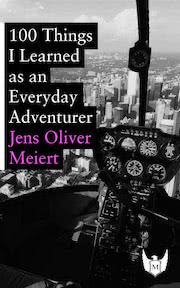3 Books for Working With Reality
Published on April 22, 2022 (↻ February 5, 2024), filed under Philosophy (RSS feed for all categories).
The last part of the book mini-series, here are three exceptional books about our—reality. Now I’ve paused studying philosophy (which I did from 2015–2018), and I’ve assumed a respectful distance again to the field, but I still believe understanding what our reality is is a precondition to live an effective and fulfilled life in it. The books that follow gave me a few ideas and tools for that. I can highly recommend reading them.
The Complete Conversations With God by Neale Donald Walsch
You will not have that for which you ask, nor can you have anything you want. This is because your very request is a statement of lack, and your saying you want a thing only works to produce that precise experience—wanting—in your reality. The correct prayer is therefore never a prayer of supplication, but a prayer of gratitude. When you thank God in advance for that which you choose to experience in your reality, you, in effect, acknowledge that it is there… in effect. Thankfulness is thus the most powerful statement to God; an affirmation that even before you ask, I have answered. Therefore never supplicate. Appreciate.
This book has shaped my thinking about the world since 2018, when I first read it, right in the middle of a challenging time. But similar to other books in this spontaneous book series, I don’t wish to go into much detail—other than saying, this book is less religious, and instead both more philosophical and more practical as it may appear like.
This, alongside its fourth part, may be one of the personally most relevant books you could read.
The Nature of Personal Reality by Jane Roberts
You are a creator translating your expectations into physical form. The world is meant to serve as a reference point. The exterior appearance is a replica of inner desire. You can change your personal world. You do change it without knowing it. You have only to use your ability consciously, to examine the nature of your thoughts and feelings and project those with which you basically agree.
From 2001–2018, this book had most influence on how I understand our reality system. And to this day, The Nature of Personal Reality, but also all the other books by Jane Roberts, guides my thinking about it. There’s astonishingly little we know about our realities, and this book… creates awareness for that.
Loving What Is by Byron Katie
The Work reveals that what you think shouldn’t have happened should have happened. It should have happened because it did, and no thinking in the world can change it. This doesn’t mean that you condone it or approve of it. It just means that you can see things without resistance and without the confusion of your inner struggle.
From 2021 on, Byron Katie also contributed to my model of the world, and of navigating it. (I believe one of my sisters had read her years earlier, but my book queue is long.) While Katie adds little to the theoretical and philosophical foundation of that model, her work—her Work—shows how to accept it. If you want a practical method to approach life, this is the book, one of her books, to pick up first, in order to—master reality; master your reality.
❧ This is it! 14 of the best books I’ve read, 14 excellent books if you go by the reviews and accolades they all received, 14 books to inspire and serve you.
I worked on these posts for a few months and at one point thought about axing the project, just posting or tweeting a link list of these books; but I pulled through, and will not judge the result. I hope the books are of use; please share feedback.
About Me

I’m Jens, and I’m an engineering lead and author. I’ve worked as a technical lead for companies like Google and as an engineering manager for companies like Miro, I’m close to W3C and WHATWG, and I write and review books for O’Reilly and Frontend Dogma.
With my current move to Spain, I’m open to a new remote frontend leadership position. Feel free to review and refer my CV or LinkedIn profile.
I love trying things, not only in web development, but also in other areas like philosophy. Here on meiert.com I share some of my views and experiences.
Read More
Maybe of interest to you, too:
- Next: The CSS Art Paradox
- Previous: 4 Books to Become a Greater Person
- More under Philosophy
- More from 2022
- Most popular posts
Looking for a way to comment? Comments have been disabled, unfortunately.

Find adventure anywhere? Try 100 Things I Learned as an Everyday Adventurer (2013). During my time in the States I started trying everything. Everything. Then I noticed that wasn’t only fun, it was also useful. Available at Amazon, Apple Books, Kobo, Google Play Books, and Leanpub.



